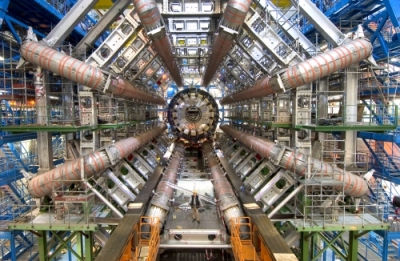Dec 19 2012
UBC physicists and astronomers are part of three of the top four breakthroughs of 2012 in Physics World’s annual accounting of the greatest achievements in the field.
 "The ATLAS and CMS experiments at CERN's Large Hadron Collider discovered a Higgs-like particle in 2012."
"The ATLAS and CMS experiments at CERN's Large Hadron Collider discovered a Higgs-like particle in 2012."
Physics professors Colin Gay, Alison Lister, Dave Axen and their team, including Zoltan Gecse , Chang Wei Loh, Bill Mills, Stephen Swedish and Simon Viel, were part of two large international teams – ATLAS and CMS – that jointly discovered a Higgs-like particle at the Large Hadron Collider at CERN.
Physicists have been trying to prove the existence of the Higgs boson for almost 50 years and its discovery completes the Standard Model of particle physics – making it the most important physics breakthrough so far in the 21st century.
Physics professors Chris Hearty, Janis McKenna, Tom Mattison and students Dave Asgeirsson and Rocky So took part in the first direct measurement of time reversal violation using the BaBar detector in California – a step towards verifying quantum field theory that is also 50 years in the making. The UBC faculty members were also among the founding members of this experiment in 1994 and made the Physics World top 10 list in 2001 and 2003.
Astronomy professor Mark Halpern and postdoctoral fellows Graeme Addison and Elia Battistelli were part of a team that used the Atacama Cosmology Telescope to make the first measurement of the bulk motion of galaxy clusters. The observation, first proposed by a Russian physicist 40 years ago, is coined as a triumph of precision cosmology and could help us better understand how the Universe was formed and shed light on the mysterious dark matter and dark energy.